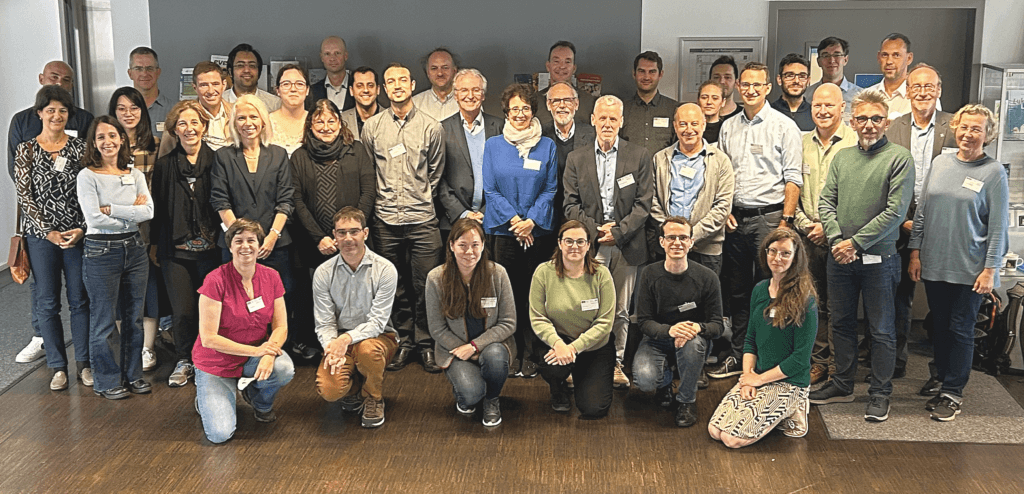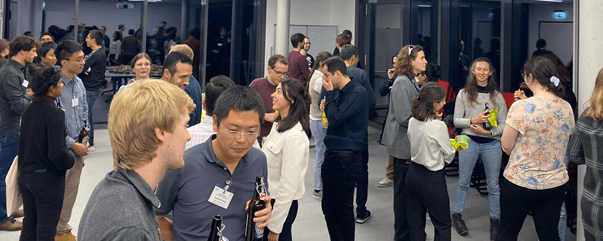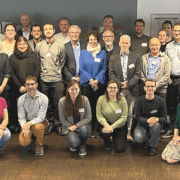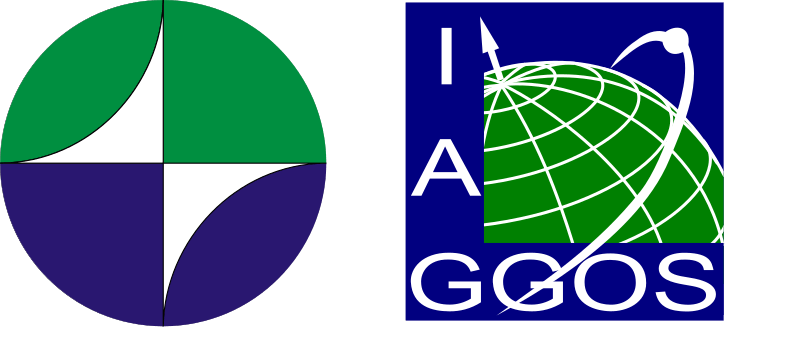GGOS Days 2024 – Meeting Summary
The Executive Committee of the Global Geodetic Observing System (GGOS) organises every year the GGOS Days to update the geodetic community on recent achievements and current challenges faced by the various colleagues involved in achieving the strategic goals of GGOS. On this occasion, thanks to the kind invitation of the Helmholtz Centre Potsdam GFZ German Research Centre for Geosciences, the GGOS Days 2024 were held as a hybrid meeting at the Wissenschaftsetage im Bildungsforum in Potsdam, Germany, on 10-11 October. Although the primary target audience of the GGOS Days are the members of the GGOS Governing Board and the Science Panel, the meeting is open to everyone. The GGOS Days 2024 were attended by 60 in-person participants, including 19 early career scientists (ECS), and 182 online participants, including 59 ECS. In total, 21 countries were represented.
 GGOS Days 2024 on-site participants, Potsdam, Germany, 10-11 October 2024 (Photo R. Heinkelmann)
GGOS Days 2024 on-site participants, Potsdam, Germany, 10-11 October 2024 (Photo R. Heinkelmann)
43 presentations (12 online) were distributed in the following sessions:
- Opening: Summary reports on recent activities of the International Association of Geodesy (IAG) and GGOS.
- GGOS Focus Areas: Updates from the three current Focus Areas: Geodetic Space Weather Research, Geohazards Monitoring, and Artificial Intelligence for Geodesy.
- Empowering collaborations with external stakeholders: Participation of the GGOS in major international Earth observation and geodesy initiatives in the policy arena and geoscience conferences, the first development plan for global geodesy of the UN Global Geodetic Centre of Excellence (UN-GGCE), initiatives to promote greater ECS involvement in geodesy, and communication and outreach efforts to raise awareness of geodesy.
- Standardisation, integration, and optimisation of geodetic products: Achievements of the GGOS Bureau of Products and Standards (GGOS-BPS) with particular emphasis on the definition of the Essential Geodetic Variables (EGVs), the computation of a new reference level ellipsoid, and contributions to Earth system modelling. This session also included presentations on progress in the determination of the International Terrestrial Reference Frame (ITRF), the International Height Reference Frame (IHRF) and the International Terrestrial Gravity Reference Frame (ITGRF).
- Enhancement of geodetic collaboration at regional level: Reports from the GGOS Affiliates, GGOS Japan and GGOS IberAtlantic, and on the first steps of GGOS Africa as a main recommendation of the Geodesy Day at the UN General Assembly Science Summit 2024 “Africa Rising: Shaping our Common Future through Geodesy. Implementing UN General Assembly Resolution A/RES/69/266: A Global Geodetic Reference Frame for Sustainable Development“.
- Updates on the global geodetic infrastructure: Achievements of the GGOS Bureau of Networks and Observations (GGOS-BNO), with highlights from the Committee on Performance Simulations and Architectural Trade-Offs (PLATO), the Working Group on Metrology of Space Geodetic Infrastructure, and a status overview of space missions relevant to geodesy, in particular Genesis and MAGIC (Mass-Change and Geosciences International Constellation).
- News from the IAG Services: Reports from the 12 IAG Scientific Services, one of the few special occasions when the Geometric and Gravity Field Services meet in the same forum.
- Optimising management for enhanced dissemination of geodetic data and products: Open and sustainable geodetic data, infrastructure and products, progress on standards for the exchange of geodetic data and metadata, implementation of DOIs for data in geodesy, and progress on the GGOS portal as the main gateway to geodetic data, information and products worldwide.
More information is available at:
GGOS Days 2024 website and photos: https://ggos.org/event/ggos-days-2024/
Presentation slides: https://zenodo.org/communities/ggos-days-2024
Recorded presentations: https://www.youtube.com/playlist?list=PLIIfsJS7iAuyNet4fBxCbvDOE96cI6VAT
In addition to the technical sessions, a guided tour through the emblematic facilities of the GFZ was organised and a “come together” for all participating young scientists took place the day before the GGOS Days. This event was not limited to the GGOS Days, but also included the GGOS Topical Meeting on the Atmosphere (7-9 October) and the GRACE/GRACE-FO 2024 Science Team Meeting (4-8 October), which also took place in Potsdam. This informal “come together” meeting was sponsored by the IAG and was attended by around 45 young colleagues who had the opportunity to make contact, get to know each other, talk about their work and network. At this point, we would like to thank Ludwig Grunwaldt and Christoph Förste from GFZ for the warm welcome and interesting explanations during the visit to GFZ, as well as Julia Koch, PhD student at ETH Zurich, who, as GGOS Early Career Representative, organised the event with the young colleagues.
 Impressions from the Early Career Scientist Meeting at the GGOS Days 2024 (Photo J. Koch)
Impressions from the Early Career Scientist Meeting at the GGOS Days 2024 (Photo J. Koch)
The GGOS Days 2024 would not have been possible without the support of many colleagues who take care of the GGOS activities, defined the topics of the meeting, chaired the sessions, gave presentations and participated in the discussions. Special thanks go to GFZ Potsdam for hosting the meeting and to the local organising committee: Kirsten Elger, Robert Heinkelmann, Nataliya Bobenko, Sascha Torkhov and Alexander Brauser. Their tireless work ensured a familiar and comfortable atmosphere throughout the meeting. Special thanks are also due to the home institutions of the GGOS Executive Committee members, who support our activities and give us the time we need to attend to GGOS business. This support is very much appreciated.
Laura Sánchez, Deutsches Geodätisches Forschungsinstitut of the Technical University of Munich (DGFI-TUM), President of GGOS
Anna Riddell, Geoscience Australia, Vice-president of GGOS
Martin Sehnal, Austrian Federal Office of Metrology and Surveying (BEV), Director of the GGOS Coordinating Office
Detlef Angermann, Deutsches Geodätisches Forschungsinstitut of the Technical University of Munich (DGFI-TUM) , Director of the GGOS-BPS
José Rodríguez, Instituto Geográfico Nacional of Spain, Director of the GGOS-BNO



